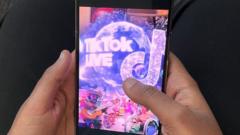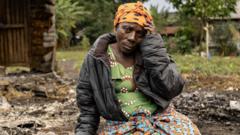Zara, a young woman with Somali roots living in the US, spends her university savings on TikTok battles that foster clan rivalries, revealing the dark and often troubling side of this popular social media phenomenon.
From Tuition Fees to TikTok: The Cost of a Digital Clan War

From Tuition Fees to TikTok: The Cost of a Digital Clan War
A young woman reveals her financial and emotional struggles while engrossed in Somali TikTok battles that pit clan loyalists against one another.
Scrolling through her transaction history, it becomes evident that Zara, a woman in her 20s with Somali heritage living in the United States, has poured a staggering amount of money—over $7,000—into TikTok's live battle feature. These battles, where influencers engage in verbal duels and rally their followers for monetary support, have led her down an alarming obsession. Initially excited by the thrill of representing her clan in these confrontations, she later faced a harrowing revelation about the darker aspects of this seemingly harmless entertainment.
The battles, particularly popular among the Somali community, are known as the Big Tribal Game, where influencers embody different Somali clans, exchanging insults alongside rap music that celebrates their heritage. An instance during October witnessed around 50,000 viewers tuning in to watch two influencers go head-to-head, not only engaging in comedic banter but also vying for gifts that serve as points.
What begins as friendly competition masks a more sinister reality. Zara recounted experiences where male influencers have crossed the line into harassment, with threats of public humiliation through doctored images. She felt powerless as one influencer, Hussein Kibray, with a substantial following, targeted her online, causing immense anxiety over what her family might see. Despite reporting his actions to TikTok, she claims no significant response was forthcoming.
The Big Tribal Game fosters a digital culture rife with the undercurrents of clan identity—a term deeply entrenched in Somali politics and history. The executions of the battles sometimes reference past civil conflicts, unearthing sensitive topics that resonate with many viewers, who range across the spectrum of Somali society.
There are growing concerns regarding the toxicity and impact of these clan-based games. Moustafa Ahmad, a security analyst, highlights the irony of diaspora members perpetuating the very tensions they fled, contributing to an atmosphere of animosity and division even while living abroad. Influencers like Bilaal Bulshawi criticize the habit of treating these battles as mere entertainment, noting the economic struggles Somalia faces.
With substantial donations flowing during these events, it’s easy for followers to mistakenly assume influencers are raking in vast fortunes. However, experts urge caution in interpreting the apparent wealth displayed on-screen, as financial realities for influencers may not align with the glamor projected during the battles.
As Zara reflects on her experiences, she recognizes the gripping draw of TikTok battles through clan pride and the common desire to participate in something larger than oneself. However, she also realizes that many "gifters," battling addiction to this digital spectacle, ultimately seek an escape from the compulsive cycle of online engagements.






















